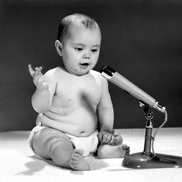
At The Speech Space this is a question we get a lot. So, here is a quick guide about what you should look for with your child!

Babies start “talking” as early as 2-3 months old. At this age your child is doing what we call vocal play, where they make funny noises and seem to be testing out their equipment. Children typically acquire vowel sounds first (e.g., “oooo” “aaaahhhhh”), so be listening for those sounds. At approximately three month intervals in your child’s life, you should observe more and more “talking”.

In children before the age of 1-year vocal communication is typically referred to as babbling and/or jargon. Actual talking should begin around the age of 1 years old and your child should have at least 1 real word. A real word is a word that has meaning outside of your home and that someone outside your household can understand (not just by parents or siblings).
From the age of 1 years old to 18 months, your child should start to sound a bit like a parrot–to the point where you have to start watching what you say around them (they do always seem to love imitating those bad words, don’t they?!). From 18 months to 2 years old, there is typically a language explosion! Your child should start acquiring and using new vocabulary words frequently and also start using at least 2-3 word phrases.
From 2 years old to 3 years old your child’s language should continue to grow and develop at a rapid speed and their language should become more sophisticated in terms of organization (i.e., grammar and vocabulary).
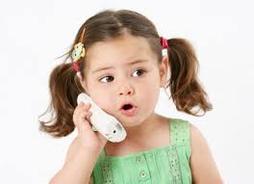
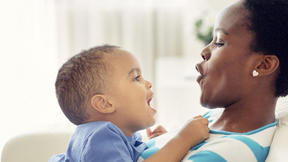
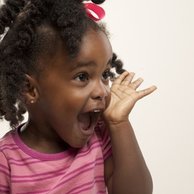
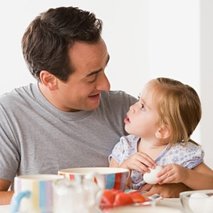
Once your child turns two years old you should see a huge leap in their language skills!
Why do some children start talking later than their peers (professionally known as: developmental delay or language delay)?There can be different reasons for this.
- Some children may have hearing loss due to frequent ear infections. Ear infections may be an indication of fluid in the ears, and if your child has fluid in their ears it will impact how and what they hear in the world around them, thus impacting their speech, language and communication development.
- Another cause can be oral-motor (muscle) weaknesses. If your child has weak oral structures (i.e., lips, tongue, cheeks, jaw) this can impact their communication as they may struggle to experiment with and form a wide variety of sounds.
- Sometimes lack of exposure to a rich language environment can cause delays as well.
At The Speech Space, parents often say their child was “just a really good, quiet baby” and that is a red-flag! Babies should not be quiet, and as discussed above, start their “talking” (e.g., babbling, vocal play and jargon) early on.
Some good news: Early intervention for your child is the best way to help! Children who receive therapy at the earliest opportunity have a better chance of catching up with their same-aged peers and meeting their potential later in life.There is never any harm to just “get it checked out” if you are having concerns. Always better safe than sorry! If you are having concerns or questions about your child’s speech, language and/or communication development reach out to us at The Speech Space! We offer free screenings, which take approximately 30 minutes, and can help identify potential problems.
